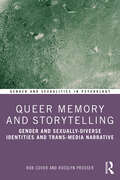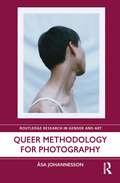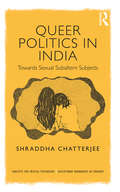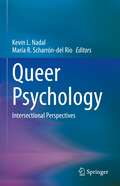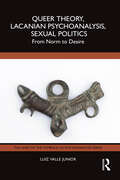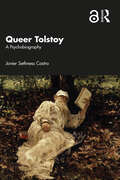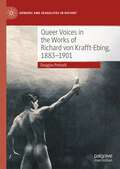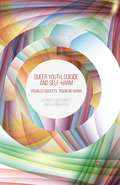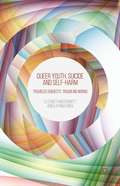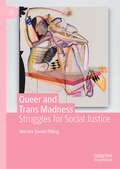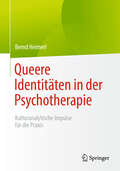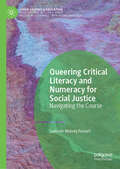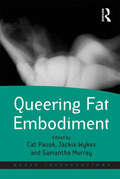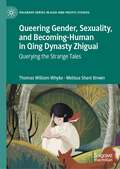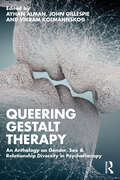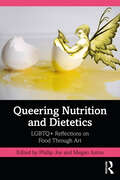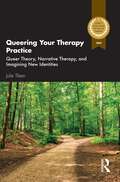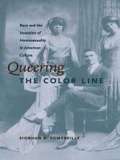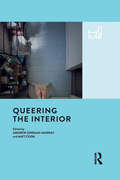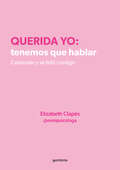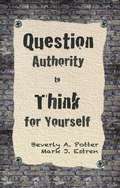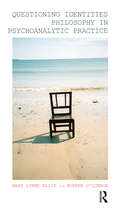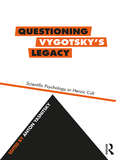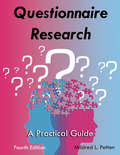- Table View
- List View
Queer Memory and Storytelling: Gender and Sexually-Diverse Identities and Trans-Media Narrative (Gender and Sexualities in Psychology)
by Rob Cover Rosslyn ProsserQueer Memory and Storytelling unpacks the ways in which the narrative practices of recounting past experiences play a formative role in formation of identities, cultures, and social change among gender and sexually diverse individuals. Grounded in theoretical research, this work delves into historical accounts, case studies, and draws from the rich tapestry of interviews conducted during extensive LGBTQ+ research studies. It explores the power of memorial storytelling to shape the narratives surrounding gender and sexual diversity, offering profound insights into the role storytelling plays as a deeply subjective, personal, communal, and cultural form of expression. The book introduces a queer perspective that reframes the study of narrative psychology, community history, philosophies of subjectivity and the socio-cultural heritage of LGBTQ+ minority communities. It also focuses on the pivotal role played by memory and reflection found within online coming-up stories and contemporary modes of shared community memorialization. By employing queer theory, ethnographic research, interviews and meticulous media/textual analysis, the book presents new frameworks for comprehending the myriad facets of identity, and investigating what it means to remember and narrate selfhood in the context of social life, actively ‘queering’ the concept of memory. Queer Memory and Storytelling will appeal to academics, researchers and students in psychology, sociology, gender and sexuality studies, and communication.
Queer Memory and Storytelling: Gender and Sexually-Diverse Identities and Trans-Media Narrative (Gender and Sexualities in Psychology)
by Rob Cover Rosslyn ProsserQueer Memory and Storytelling unpacks the ways in which the narrative practices of recounting past experiences play a formative role in formation of identities, cultures, and social change among gender and sexually diverse individuals.Grounded in theoretical research, this work delves into historical accounts, case studies, and draws from the rich tapestry of interviews conducted during extensive LGBTQ+ research studies. It explores the power of memorial storytelling to shape the narratives surrounding gender and sexual diversity, offering profound insights into the role storytelling plays as a deeply subjective, personal, communal, and cultural form of expression. The book introduces a queer perspective that reframes the study of narrative psychology, community history, philosophies of subjectivity and the socio-cultural heritage of LGBTQ+ minority communities. It also focuses on the pivotal role played by memory and reflection found within online coming-up stories and contemporary modes of shared community memorialization. By employing queer theory, ethnographic research, interviews and meticulous media/textual analysis, the book presents new frameworks for comprehending the myriad facets of identity, and investigating what it means to remember and narrate selfhood in the context of social life, actively ‘queering’ the concept of memory.Queer Memory and Storytelling will appeal to academics, researchers and students in psychology, sociology, gender and sexuality studies, and communication.
Queer Methodology for Photography (Routledge Research in Gender and Art)
by Asa JohannessonThis book presents new ways of approaching photographic discourse from a queer perspective, offering discussions on what a queering methodology for photography may entail by drawing links between artistic strategies in photographic practice and key theoretical concepts from photography theory, queer theory, critical theory, and philosophy. With different examples of conceptual perspectives, including representation, formalism, and mediumlessness, it seeks to diversify queer methodology for photography. While primarily addressing photography, this book is entwined with broader philosophical questions concerning identity, difference, and the creations of systems of thought that limit the possibilities of existence to binary categorisation. It proposes a new concept of the photographic image that addresses its materiality, in the form of the poetic and the political, in relationship to a generative principle that is named as a queer quality: the photograph’s ability to voice queer concerns also beyond its role as representation. This book will be of interest to scholars working in photography, art history, queer studies, new materialism, and posthumanism.
Queer Politics in India: Towards Sexual Subaltern Subjects (Concepts for Critical Psychology)
by Shraddha ChatterjeeQueer Politics in India simultaneously tells two interconnected stories. The first explores the struggle against violence and marginalization by queer people in the Indian subcontinent, and places this movement towards equality and inclusion in relation to queer movements across the world. The second story, about a lesbian suicide in a small village in India, interrupts the first one, and together, these two stories push and pull the book to elucidate the failure and promise of queer politics, in India and the rest of the world. This book emerges at a critical time for queer politics and activism in India, exploring the contemporary queer subject through the different lenses of critical psychology, Lacanian psychoanalysis, feminist and queer theory, and cultural studies in its critique of the constructions of discourses of ‘normal’ sexuality. It also examines how power determines further segregations of ‘abnormal’ sexuality into legitimate and illegitimate queer subjectivities and authentic and inauthentic queer experiences. By allowing a multifaceted and engaged critique to emerge that demonstrates how the idea of a universal queer subject fails lower class, lower caste queer subjects, and queer people of colour, the author expertly highlights how all queer people are not the same, even within queer movements, as the book asks the questions, "which queer subject does queer politics fight for?", and, "what is the imagination of a queer subject in queer politics?" This hugely important and timely work is relevant across many disciplines, and will be useful for students of psychology and other academic areas, as well as researchers and activist organizations.
Queer Psychology: Intersectional Perspectives
by Kevin L. Nadal María R. Scharrón-del RíoQueer Psychology is the first comprehensive book to examine the current state of LGBTQ communities and psychology, through the lenses of both queer theory and Intersectionality theory. Thus, the book describes the experiences of LGBTQ people broadly, while also highlighting the voices of LGBTQ people of color, transgender and gender nonconforming people, those of religious minority groups, immigrants, people with disabilities, and other historically marginalized groups. Each chapter will include an intersectional case example, as well as implications for policy and practice.This book is especially important as there has been an increase in psychology and counseling courses focusing on LGBTQ communities; however, students often learn about LGBTQ-related issues through a White cisgender male normative perspective. The edited volume contains the contributions of leading scholars in LGBTQ psychology, and covers a number of concepts – ranging from identity development to discrimination to health.
Queer Theory, Lacanian Psychoanalysis, Sexual Politics: From Norm to Desire (The Lines of the Symbolic in Psychoanalysis Series)
by Luiz Valle JuniorQueer Theory, Lacanian Psychoanalysis, Sexual Politics is a consideration of the relationship between LGBTQIA+ politics, Lacanian psychoanalytic theory, and queer theory.The book argues, through readings of Judith Butler’s Gender Trouble and Lee Edelman’s No Future, that core queer categories – such as normativity and anti-normativity – sidestep questions that are crucial not only to contemporary sexual politics but also to psychoanalytic thinking and clinical work. Luiz Valle Junior attends to the queer account of the political shortcomings of the contemporary LGBTQIA+ movement, as well as to the inadequacies of the queer reception of Lacanian psychoanalysis and makes a case for the ongoing relevance of Lacanian psychoanalysis to thinking through a renewed sexual politics. The book reflects on the potentiality of a Lacanian theory of sexual politics to challenge the dominance of identity in contemporary LGBTQIA+ activism and in the queer theoretical archive. Valle Junior shifts the discussion of sexual politics from the terrain of normativity and identity to the terrain of desire and enjoyment, and questions enduring heteronormative positions that contemporary Lacanians continue to espouse, against Lacan’s own position.Queer Theory, Lacanian Psychoanalysis, Sexual Politics will be of great interest to academics and scholars of queer studies, psychoanalysis, and in the LGBTQIA+ movement, and more broadly in the relation of identity analytics to contemporary psychoanalytic and political thought.
Queer Tolstoy: A Psychobiography
by Javier Sethness CastroQueer Tolstoy is a multidimensional work combining psychoanalysis, political history, LGBTQ+ studies, sexology, ethics, and theology to explore the life and art of Count Lev Nikolaevich Tolstoy. Using a psychobiographical framework, Sethness Castro uncovers profoundly queer dimensions in Tolstoy’s life experiences and art. Deftly contributing to the progressive and radical analysis of gender and sexuality, this book examines how Tolstoy’s erotic dissidence informed his anarchist politics, anti-militarist ideals, and voluminous literary production. Sethness Castro analyzes the influence of Buddha, Socrates, Jesus, Cervantes, Rousseau, Kant, Herzen, Proudhon, Chernyshevsky, and his mother Marya Volkonskaya on the artist's writings. Furthermore, he details Tolstoy's emblematic linking of LGBTQ+ desire with moral and erotic self-determination and resistance to Tsarist despotism—especially in War and Peace. This book is vital reading for those interested in the intersection of literature, psychoanalysis, queer studies, and Russian history.
Queer Voices in the Works of Richard von Krafft-Ebing, 1883–1901 (Genders and Sexualities in History)
by Douglas PretsellThis book is a critical edition of the autobiographical case studies used by the Austro-German psychiatrist Richard von Krafft-Ebing between 1883 and 1901. Forty-one individual case studies of same-sex attracted men and women, in their own words, made an eye-catching component of Krafft-Ebing’s most important work, PsychopathiaSexualis. Although the psychiatrist probably edited the autobiographical case studies, with the racier passages rendered in rather rudimentary Latin, what is particularly remarkable is that he preserved an unmistakeable queer discourse in some of the case studies that disputed the pathologising ideologies of the psychiatric texts in which they were embedded. Most of the autobiographies of same-sex attracted men follow the discursive patterns established in nineteenth-century psychiatry in providing descriptions of body features including genital size and shape, mental and physical health, family histories of health and disease, and accounts of life events from childhood to the present. This was because these men had been following Krafft-Ebing’s works and were now using their autobiographical contributions in Psychopathia Sexualis as a platform for negotiating the parameters of sexual orientation. Women’s sexuality was a relatively undeveloped component of Krafft-Ebing’s sexology but there are four case studies of women containing autobiographical content. Similarly, gender variance was hardly differentiated from sexuality at this period, but there are three autobiographies that clearly articulate cross gender identification, anticipating the future categories of transsexual and transgender. Krafft-Ebing reserved his therapeutic interventions to those individuals attracted to both sexes where hypnosis could supress same sex urges. Seven of these individuals supplied sexual autobiographies with two of them undergoing treatment as part of the overall case study. Together, these forty-one accounts give the reader a window into queer self-conceptions in Austria and Germany as the nineteenth century drew to a close.
Queer Youth, Suicide and Self-Harm: Troubled Subjects, Troubling Norms
by E. McDermott K. RoenOffering a new way of understanding the high self-harm and suicide rates among sexual and gender minority youth, this book prioritises the perspectives and experiences of queer young people, including those who have experience of self-harming and/or feeling suicidal. Presenting analysis based on research carried out with young people both online and face-to-face, the authors offer a critical perspective on the role of norms, namely developmental norms, gender and sexuality norms, and neoliberal norms, in the production of self-harming and suicidal youth. Queer Youth, Suicide and Self-Harm is unique in the way it works at the intersection of class and sexuality, and in its specific focus on transgender youth and the concept of embodied distress. It also examines the implications of this research for self-harm reduction and suicide prevention.
Queer Youth, Suicide and Self-Harm: Troubled Subjects, Troubling Norms
by Elizabeth McDermott Katrina RoenOffering a new way of understanding the high self-harm and suicide rates among sexual and gender minority youth, this book prioritises the perspectives and experiences of queer young people, including those who have experience of self-harming and/or feeling suicidal. Presenting analysis based on research carried out with young people both online and face-to-face, the authors offer a critical perspective on the role of norms, namely developmental norms, gender and sexuality norms, and neoliberal norms, in the production of self-harming and suicidal youth. Queer Youth, Suicide and Self-Harm is unique in the way it works at the intersection of class and sexuality, and in its specific focus on transgender youth and the concept of embodied distress. It also examines the implications of this research for self-harm reduction and suicide prevention.
Queer and Trans Madness: Struggles for Social Justice
by Merrick Daniel PillingThis book urges those invested in social justice for 2SLGBTQ people to interrogate the biomedical model of mental illness beyond the diagnoses that specifically target gender and sexual dissidence. In this first comprehensive application of Mad Studies to queer and trans experiences of mental distress, Pilling advances a broad critique of the biomedical model of mental illness as it pertains to 2SLGBTQ people, arguing that Mad Studies is especially amenable to making sense of queer and trans madness. Based on empirical data from two qualitative research studies, this book includes analyses of inpatient chart documentation from a psychiatric hospital and interviews with those who have experienced distress. Using an intersectional lens, Pilling critically examines what constitutes mental health treatment and the impacts of medical strategies on mad queer and trans people. Ultimately, Queer and Trans Madness: Struggles for Social Justice explores the emancipatory promise of queer and trans madness, advocating for more resources to respond to crisis and distress in ways that are non-coercive, non-carceral, and honour autonomy as well as interdependence within 2SLGBTQ communities.
Queere Identitäten in der Psychotherapie: Kulturanalytische Impulse für die Praxis
by Bernd HeimerlDie Queer-Theorie und die Queer Studies nehmen seit langem Einfluss auf die zeitgenössische psychoanalytische Praxis und die psychoanalytische Theoriebildung. Dabei werden mehr die individuellen klinischen „Fälle“ im Fachdiskurs besprochen und weniger die kulturanalytischen, geschichtlichen und gesellschaftlichen Veränderungen im sog. kulturellen Übergangsraum: In diesem queeren Übergangsraum finden sich individuelle Coming-out- und Coming-in Prozesse als auch kulturelle Aneignungsprozesse, es sind Migrationsbewegungen von einer (geschlechtlichen) Kultur in eine andere. Welche realen und psychischen Übergangsräume schaffen sich queere Personen? Welche Orte finden sie vor, welche werden verlassen, welche ersehnt? Queere Identitäten im Übergang zu betrachten, bedeutet die Transformation von einer Kultur in eine andere, von einer heteronormativen in eine non-heteronormative Um- und Mitwelt. Dieses Fachbuch integriert aus psychoanalytischer Sicht gesellschaftliche und individuelle Aspekte des Themas Queere Identitäten und bietet Psychotherapeut:innen aller Therapierichtungen eine neue Perspektive und übergreifende Ansatzpunkte im Kontakt mit queeren Personen. Das Verstehen queerer (Körper-) Biografien wird gefördert und die Bedeutung für die individuelle Behandlung anhand von kulturanalytischen Denkanstößen praxisnah abgeleitet.
Queering Critical Literacy and Numeracy for Social Justice: Navigating the Course (Queer Studies and Education)
by Summer Melody PennellThis volume explores the value of using queer pedagogy in an interdisciplinary middle school classroom to promote a better understanding of social justice and the social construction of knowledge among students. In the course of the study, which combined student-centered literacy and mathematical inquiries through a social justice lens, students used critical literacy skills to research social justice topics, learned to read numerical data like traditional print text, and created and solved their own math problems. In bringing together critical mathematics and critical literacy through a queer lens, the author offers new ways of thinking that challenges norms and helps students embrace new concepts of learning for the modern era.
Queering Fat Embodiment (Queer Interventions)
by Samantha Murray Cat Pausé Jackie WykesCultural anxieties about fatness and the attendant stigmatisation of fat bodies, have lent a medical authority and cultural legitimacy to what can be described as ’fat-phobia’. Against the backdrop of the ever-growing medicalisation, pathologisation, and commodification of fatness, coupled with the moral panic over an alleged ’obesity epidemic’, this volume brings together the latest scholarship from various critical disciplines to challenge existing ideas of fat and fat embodiment. Shedding light on the ways in which fat embodiment is lived, experienced, regulated and (re)produced across a range of cultural sites and contexts, Queering Fat Embodiment destabilises established ideas about fat bodies, making explicit the intersectionality of fat identities and thereby countering the assertion that fat studies has in recent years reproduced a white, ableist, heteronormative subjectivity in its analyses. A critical queer examination on fatness, Queering Fat Embodiment will be of interest to scholars of cultural and queer theory, sociology and media studies, working on questions of embodiment, stigmatisation and gender and sexuality.
Queering Gender, Sexuality, and Becoming-Human in Qing Dynasty Zhiguai: Querying the Strange Tales (Palgrave Series in Asia and Pacific Studies)
by Melissa Shani Brown Thomas William WhykeThis book offers queer readings of Chinese Qing Dynasty zhiguai, ‘strange tales’, a genre featuring supernatural characters and events. In a unique approach interweaving Chinese philosophies alongside critical theories, this book explores tales which speak to contemporary debates around identity and power. Depictions of porous boundaries between humans and animals, transformations between genders, diverse sexualities, and contextually unusual masculinities and femininities, lend such tales to queer readings. Unlike previous scholarship on characters as allegorical figures or stories as morality tales, this book draws on queer theory, animal studies, feminism, and Deleuzian philosophy, to explore the ‘strange’ and its potential for social critique. Examining such tales enriches the scope of historic queer world literatures, offering culturally situated stories of relationships, desires, and ways of being, that both speak to and challenge contemporary debates.
Queering Gestalt Therapy: An Anthology on Gender, Sex & Relationship Diversity in Psychotherapy
by John Gillespie Vikram Kolmannskog Ayhan AlmanThe first peer-reviewed book of its kind, this important volume addresses a current gap in the field of gestalt therapy: that the practice—and psychotherapy more broadly—still suffers from pervasive hetero- and cis-normativity. This book offers gestalt-therapy-based research and training material on gender, sex, and relationship diversity (GSRD), including chapters on a variety of GSRD issues and how therapists can become more GSRD-sensitive. The contributors position themselves across the whole spectrum of GSRD and offer their voices as an invitation to further queer the gestalt community with diverse content ranging from academic, research-oriented pieces to experiential, reflective perspectives. Featured chapters explore topics including gender-radical clients, sex and sexuality, relationship diversity, integrating GSRD and gestalt therapy, and addressing heteronormativity in gestalt therapy training. Queering Gestalt Therapy is for everyone who is interested in gender, sex, and relationship diversity, especially as they relate to gestalt therapy practice. This book will be especially useful for therapists, supervisors, coaches, and students of gestalt therapy.
Queering Nutrition and Dietetics: LGBTQ+ Reflections on Food Through Art
by Phillip Joy and Megan AstonThis book presents experiences of LGBTQ+ people relating to food, bodies, nutrition, health, wellbeing, and being queer through critical writing and creative art. The chapters bring LGBTQ+ voices into the spotlight through arts-based scholarship and contribute to experiential learning, allowing for more understanding of the lives of LGBTQ+ people within the dietetic profession. Divided into three parts, the first explores eating, food, and bodies; the second discusses communities, connections, and celebrations; and the final part covers care in practice. Topics include body image, eating disorders, weight stigma, cooking and culinary journeys, queer food culture, queer practices in nutrition counseling, and gendered understandings of nutrition. Exploring not only experiences of marginalization, homophobia, transphobia, and cisheteronormativity within dietetics and nutritional healthcare, this collection also dives into the positive connections and supportive communities that food can create. Special attention is paid to the intersections of oppression, colonialism, social justice, and politics. This book will be beneficial to all health professionals, educators, and students creating and fostering safer, more inclusive, and more accepting environments for their LGBTQ+ clients.
Queering Your Therapy Practice: Queer Theory, Narrative Therapy, and Imagining New Identities
by Julie TilsenQueering Your Therapy Practice: Queer Theory, Narrative Therapy, and Imagining New Identities is the first practice-based book for therapists that presents queer theory and narrative therapy as praxis allies. This book offers fresh, hopeful resources for therapists committed to culturally responsive work with queer and trans people and the important others in their lives. It features clinical vignettes from the author’s practice that bring to life the application of queer theory through the practice of narrative therapy and serve as teaching tools for the specific concepts and practices highlighted in individual, relational, and family therapy contexts. The text also weaves in questions for reflection and discussion, and Q-tips summarizing key points and practices. A practical resource for both seasoned therapists and students, Queering Your Practice Theory demonstrates how therapeutic practice can be informed, improved, and deepened by queer theory.
Queering the Color Line: Race and the Invention of Homosexuality in American Culture
by Siobhan B. SomervilleQueering the Color Line transforms previous understandings of how homosexuality was "invented" as a category of identity in the United States beginning in the late nineteenth century. Analyzing a range of sources, including sexology texts, early cinema, and African American literature, Siobhan B. Somerville argues that the emerging understanding of homosexuality depended on the context of the black/white "color line," the dominant system of racial distinction during this period. This book thus critiques and revises tendencies to treat race and sexuality as unrelated categories of analysis, showing instead that race has historically been central to the cultural production of homosexuality. At about the same time that the 1896 Supreme Court Plessy v. Ferguson decision hardened the racialized boundary between black and white, prominent trials were drawing the public's attention to emerging categories of sexual identity. Somerville argues that these concurrent developments were not merely parallel but in fact inextricably interrelated and that the discourses of racial and sexual "deviance" were used to reinforce each other's terms. She provides original readings of such texts as Havelock Ellis's late nineteenth-century work on "sexual inversion," the 1914 film A Florida Enchantment, the novels of Pauline E. Hopkins, James Weldon Johnson's Autobiography of an Ex-Coloured Man, and Jean Toomer's fiction and autobiographical writings, including Cane. Through her analyses of these texts and her archival research, Somerville contributes to the growing body of scholarship that focuses on discovering the intersections of gender, race, and sexuality. Queering the Color Line will have broad appeal across disciplines including African American studies, gay and lesbian studies, literary criticism, cultural studies, cinema studies, and gender studies.
Queering the Interior (Home Ser.)
by Andrew Gorman-MurrayQueering the Interior problematizes the familiar space of ‘home’. It deploys a queer lens to view domestic interiors and conventions and uncovers some of the complexities of homemaking for queer people.Each of the book’s six sections focuses on a different room or space inside the home. The journey starts with entryways, and continues through kitchens, living spaces, bedrooms, bathrooms, and finally, closets and studies. In each case up to three specialists bring their disciplinary expertise and queer perspectives to bear. The result is a fascinating collection of essays by scholars from literary studies, geography, sociology, anthropology, history and art history. The contributors use historical and sociological case studies; spatial, art and literary analyses; interviews; and experimental visual approaches to deliver fresh, detailed and grounded perspectives on the home and its queer dimensions. A highly creative approach to the analysis of domestic spaces, Queering the Interior makes an important contribution to the fields of gender studies, social and cultural history, cultural studies, design, architecture, anthropology, sociology, and cultural geography.
Querida yo: Conócete y sé feliz contigo
by Elizabeth Clapés @esmipsicologaQuerida yo: tenemos que hablar, para trabajar nuestra salud mental y mejorar nuestra calidad de vida y relación con nosotras mismas Antes, cuando escuchaba hablar sobre la importancia de «conocerse a una misma», no lo entendía. Cuando llevas treinta años viviendo contigo, ¿se puede saber qué es lo que te falta por conocer? ¿De verdad hay algo que puede pillarte por sorpresa? En nuestro día a día, tenemos miles de sentimientos, personas, heridas, situaciones que nos generan malestar. Identificarlas y saber distinguir las que podemos cambiar de las que no es muy importante para dejar de hacernos las preguntas de siempre ¿Por qué me noto tan sensible? ¿Por qué siempre estoy a la defensiva? ¿Por qué siento ansiedad? ¿Qué me pasa? Por eso, querida amiga, tenemos que hablar. Vamos a parar un momento para conocernos, corregirnos, aceptarnos, perdonarnos. Y una parte muy importante: para mandar a la mierda lo que sea necesario. A ver si así podemos empezar a querernos tanto como nos merecemos, que ya toca.
Question Authority; Think for Yourself
by Mark James Estren Beverly A. PotterWe have freedom of speech but we're afraid to speak. Our lives have become subjected to PC tyranny-a constant fear of "offending" someone. We think that we are independent and that it is the other guy who is influenced, brain washed, duped, persuaded. We feel like we think for ourselves. How can we "feel" otherwise? There's no way to know because countless influences and interactions have molded us.We're members of various groups-circles of friends, family, professional groups, hobby group, and workplace groups. Groups have a way of developing a view that it imposes with a kind of group-think. We want to belong, to be liked and included so go along and get along. We don't make waves by questioning. If we have a different view, we keep it to ourselves. Why rock the boat?Thinking for yourself is not so easy. When encountering an argument to a long held opinion or a wild idea, we use critical thinking to evaluate it, as we were taught to do in school. The problem is that critical thinking is critical. It focuses our thinking on the negative-what doesn't work, what's wrong with the idea-and encourages my-side thinking where we evaluate evidence in a way that favors our beliefs and entraps us into closed-mindedness. Thinking for yourself requires open-mindedness. Open-mindedness is being receptive and, when the issue is important, calls for actively searching for evidence against your beliefs.Thinking is not driven by answers but by questions. Every intellectual field is born out of a cluster of questions to which answers are needed. Had no questions been asked by those who laid the foundation for a field - for example, Physics or Biology - the field would never have been developed.We define tasks, express problems and delineate issues with questions. Answers signal an end point and stop thought, except when an answer generates a further question.Timothy Leary said, "to think for yourself you must question authority". To think, you must question. To think through or rethink anything, one must ask questions that stimulate thought. The quality of your questions determines the quality of your thinking.Thinking begins within some content when questions are generated. No questions equals no understanding. To engage in thinking through your content you must stimulate your thinking with questions that lead to further questions.Our own opinions is one authority we should frequently question. Times change. We change. Perspectives and values change. Book explores how opinions and values we held in the past need periodic evaluation and challenge. Independent thinkers evolve and need to shed the shackles of old views and opinions.Ridicule is the strongest weapon for pressing us to conform. It is a kind of bait that if you go for it will entrap you in an argument you can't win and leave you looking ridiculous and deflated. Question Authority; Think for Yourself offers techniques, with examples, of how to deflect attacks, side-tracks, and put-downs.If you've bitten your tongue and later wished you'd spoken up and not been cowed into silence by a mocking co-worker when you revealed a "politically incorrect" viewpoint, you'll find much of interest in Question Authority; Think for Yourself .
Questioning Identities: Philosophy in Psychoanalytic Practice
by Mary Lynne EllisThis book offers a revision of psychoanalytic theory. It highlights how philosophical perspectives on language, embodiment, time, history, and conscious/unconscious experiences can contribute to clinical interpretations of gender, sexuality, race, age, culture, and class.
Questioning Vygotsky's Legacy: Scientific Psychology or Heroic Cult
by Anton YasnitskyThis accessible collection of essays critically examines Vygotsky’s scientific legacy. The book is solidly grounded in the "revisionist revolution" context and encourages constructive questioning of Vygotsky’s theory of human development. It tackles thought-provoking issues such as the true value of his scholarship, the possible falsification of his scientific legacy, and the role of political factors and the Communist parties in the worldwide dissemination of his work. It is essential reading on Vygotskian psychology and of interest to students and researchers in developmental psychology, history of psychology, history of science, Soviet/Russian history, philosophical science and education.
Questionnaire Research: A Practical Guide
by Mildred L Patten• Provides step-by-step guidance for students who will be conducting their first surveys to collect factual information, measure attitudes, and evaluate products, services, and programs using questionnaires. • Each chapter is structured around easy-to-follow guidelines. • Numerous examples illustrate the guidelines. The examples are on timely topics of interest to students. • This short book is an ideal supplement for guiding students through a class project. At the end of Chapter 1, they write the objectives for their questionnaires. They then follow the guidelines in subsequent chapters to complete their project. • Exercises at the end of each chapter allow students to practice their newly acquired skills. • Students learn that using questionnaires in research is both an art and a science—with principles that need to be followed for efficient, effective data collection. • Thoroughly field-tested for student interest and comprehension, this book is sure to please both you and your students. • We’ve had highly positive feedback from the numerous professors who have adopted this book to guide students in conducting term projects.
